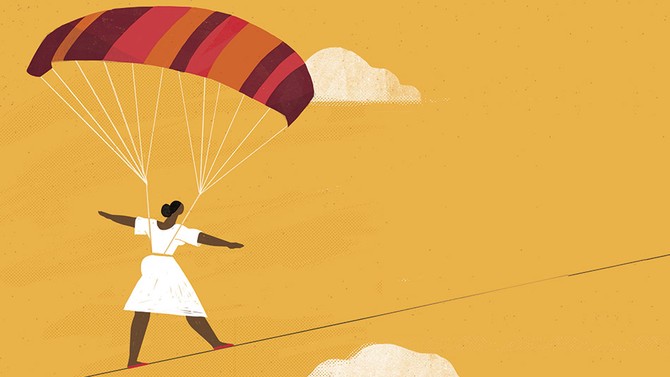20 More Questions Every Woman Should Ask Herself
Spend some time with our second annual roundup of essential questions, and we promise you'll discover things about yourself—remarkable, rewarding things—that you never anticipated.
Am I Ready for Whatever Comes?
My father, a hardworking dentist who loved to read and play pinochle, died of a heart attack when I was 5 and my mother was in her late 30s. My mother had a strategy for facing the world: She didn't believe in luck. She believed in sturdiness. Though we spent years at odds, even I (her most critical witness) had to admire this. Strength was her plan B.
While this approach failed to make certain human concessions—she disapproved of weeping at funerals, sang a soap opera theme song if she thought I was overdramatizing—I have come to regard it as one of the gifts of my upbringing. I don't mean (who would believe me if I did?) that I've always behaved well in the face of disaster. But I had a model of hardiness to copy, standards to pull me through. A plan B, whatever its parameters, assumes not only that catastrophe will strike, but also that a person can be equal to it.
As a kid, I often imagined possible tests. "If an enemy army took over, would you deny your beliefs? Would you betray someone if it got really bad?" These rehearsals showed a desire to be ready for the worst, a wish to be fearless.
Some of the happier memories of my childhood are the times when the lights went out. Hurricanes can hit New Jersey in the fall, and we were always ready. Flashlights, candles, food, blankets. During one storm, my older brother put a birthday candle in the candlestick from the game Clue, which I thought was incredibly witty. Lack of panic made us festive.
I live in Manhattan now, and when Hurricane Sandy hit in 2012, I was stocked with bottled water, a filled tub and enough dog food for weeks. I try to remember that my carry-on, however minimal, had better contain a nightgown, a toothbrush and underwear, just in case the airline loses my luggage. Who can say it won't?
—Joan Silber, author of, most recently, the short-story collection Fools
While this approach failed to make certain human concessions—she disapproved of weeping at funerals, sang a soap opera theme song if she thought I was overdramatizing—I have come to regard it as one of the gifts of my upbringing. I don't mean (who would believe me if I did?) that I've always behaved well in the face of disaster. But I had a model of hardiness to copy, standards to pull me through. A plan B, whatever its parameters, assumes not only that catastrophe will strike, but also that a person can be equal to it.
As a kid, I often imagined possible tests. "If an enemy army took over, would you deny your beliefs? Would you betray someone if it got really bad?" These rehearsals showed a desire to be ready for the worst, a wish to be fearless.
Some of the happier memories of my childhood are the times when the lights went out. Hurricanes can hit New Jersey in the fall, and we were always ready. Flashlights, candles, food, blankets. During one storm, my older brother put a birthday candle in the candlestick from the game Clue, which I thought was incredibly witty. Lack of panic made us festive.
I live in Manhattan now, and when Hurricane Sandy hit in 2012, I was stocked with bottled water, a filled tub and enough dog food for weeks. I try to remember that my carry-on, however minimal, had better contain a nightgown, a toothbrush and underwear, just in case the airline loses my luggage. Who can say it won't?
—Joan Silber, author of, most recently, the short-story collection Fools
From the February 2015 issue of O, The Oprah Magazine


